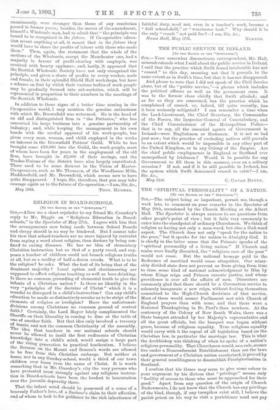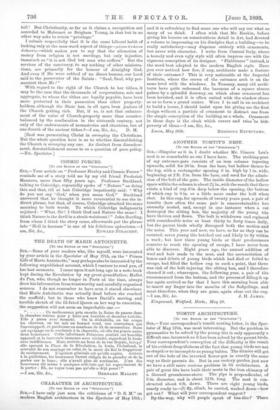THE "SPIRITUAL PERSONALITY" OF A NATION.
[To THE EDITOR OF THE " SPECTATOR."] Si,—The subject being so important, permit me, though a week late, to comment on your remarks in the Spectator of May 20th, occasioned by the Church Meeting at the Albert Hall. The Spectator is always anxious to see questions from other people's point of view ; but it fails very commonly to enter into the standpoint of ordinary Churchmen. We think of religion as having not only a man-ward, but also a God-ward aspect. The Church does not only "speak for the nation to the poor," but it speaks for the nation to Almighty God. It is chiefly in the latter sense that the Primate speaks of the "spiritual personality of a living nation." If Church and realm were finally disunited, the "religious care of the poor" would not cease. But the national homage paid to the Redeemer of mankind would cease altogether. Our miser- ably divided state does not prevent us from giving from time to time some kind of national acknowledgment to Him by whom Kings reign and Princes execute justice, and whose providence is over all the affairs of men. Dissenters are commonly glad that there should be a Coronation service to solemnly inaugurate a new reign, without feeling themselves committed to the High-Church doctrines of that service. Most of them would sooner Parliament met with Church of England prayers than with none, and that there were a National Thanksgiving in St. Paul's than nowhere. At the centenary of the Colony of New South Wales, there was a State banquet attended by her Majesty's representative and all the great officials, but the banquet was begun without grace, because of religious equality. True religious equality would carry with it the repeal of all legislation based on the Christian law, in particular the marriage law. This is what the Archbishop was thinking of when he spoke of a nation's religions personality. That Churchmen would, as a rule, sooner live under a Nonconformist Establishment than see the laws and government of a Christian nation secularised, is proved by their general unwillingness to disestablish Presbyterianism in Scotland.
I confess that his Grace may seem to give some colour to your argument by his dictum that "privilege" means only "facility of access, to those who must be approached for their good." Apart from any question of the origin of Church Endowments, I do not know that the Church has any privilege of the kind, though, if any turnpikes exist still, I believe the parish priest on his way to visit a parishioner need not pay toll ! But Christianity, so far as it claims a recognition not accorded to Mahomet or Brigham Young, in that but in no other way asks to retain "privilege."
I submit respectfully that it is the same Liberal habit of looking only at the man-ward aspect of things—lhfrPOY érivroi dpgponroc—which makes you to say that the alienation of money from religion is not sacrilege, but only injustice, inasmuch as "it is not God but man who suffers." But the services of the sanctuary, to say nothing of other ministra- tions, are primarily for the honour of Almighty God. And even if He were robbed of no direct honour, our Lord said to the persecutor of the Saints : "Saul, Saul, why per- secutest thou Me?"
With regard to the right of the Church to her tithes, it may be the case that the thousands of corporations, sole and aggregate, to whom the tithes are legally payable, have been more protected in their possession than other property- holders, although the State has, in all ages, been jealous of the Church getting rich. Bat, if so, is not that enhance- ment of the value of Church-property more than counter- balanced by the confiscation in the sixteenth century, not only of the endowments of monasteries and chantries, but of
one-fourth of the ancient tithes 1)—I am, Sir, &c., D. M.
[Saul was persecuting Christ in wronging the Christians. But the whole question here is as to whether disestablishing the Church is wronging any one. As distinct from disendow- ment, disestablishment seems to us a question of pure policy. —ED. Spectator.]







































 Previous page
Previous page